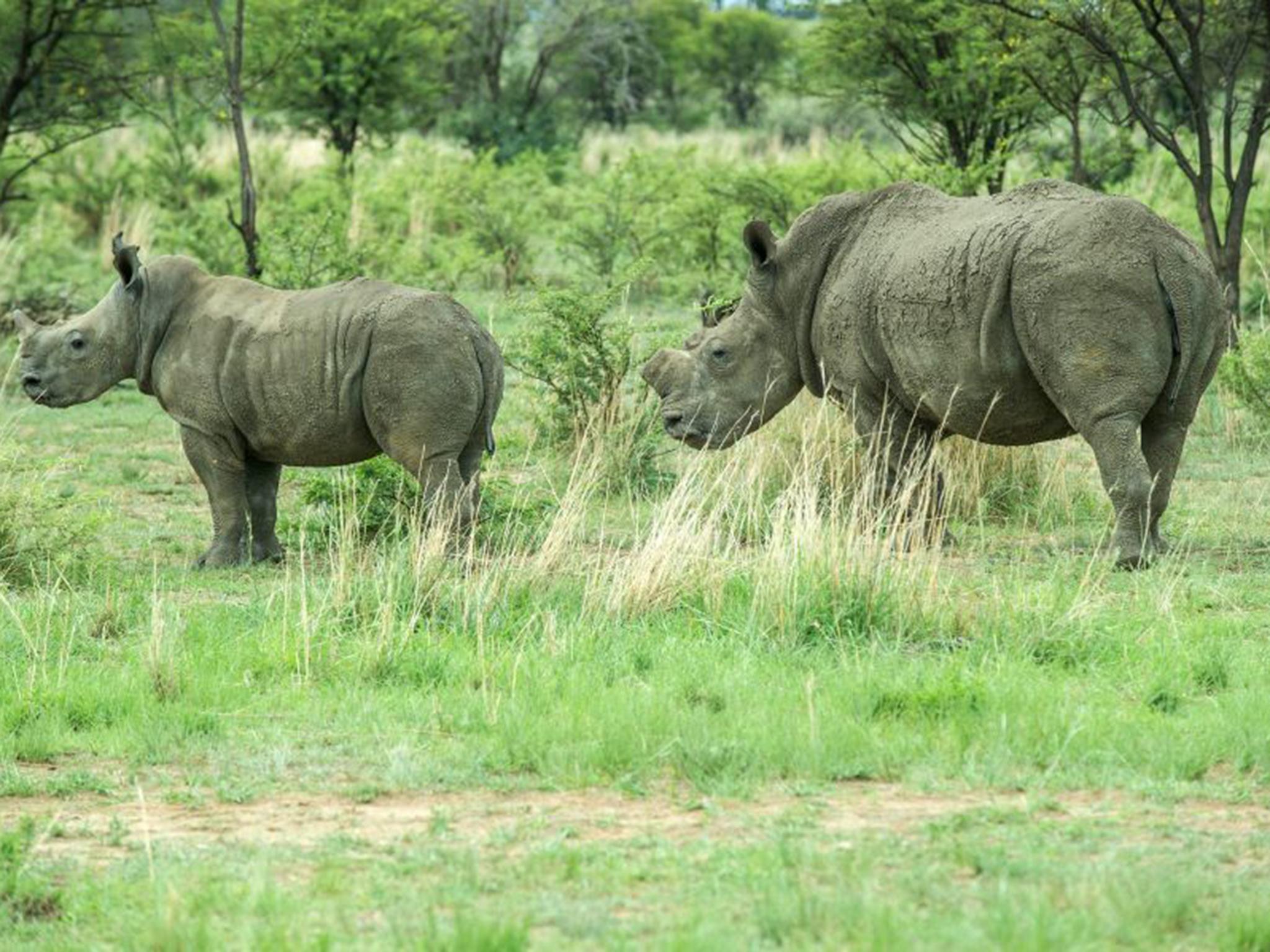Rhinos' survival 'hangs in balance' due to legalised animal parts trade
'It seems almost inconceivable that any country or individual would actively support opening up legal international trade in rhino horn,' says Will Travers of the Born Free Foundation

The survival of some of “the world’s most iconic species” – such as elephants, rhinos and lions – is hanging in the balance amid a campaign to legalise the international trade in rhino horn and other animal parts, it has been warned.
Speaking ahead of a debate about the issue at London’s Royal Institution on Wednesday, Will Travers, the president of the Born Free Foundation, said some countries were now seeking to “make this nightmare a reality”.
However the world’s largest rhino farmer, John Hume, questioned why, if a ban on trading rhino horn was such a “positive” conservation strategy, thousands of rhinos were being killed by poachers in South Africa.
The Convention on International Trade in Endangered Species of Wild Fauna and Flora (CITES) is due to hold a major international meeting in Johannesburg later this year.
Mr Travers told The Independent that people could be “forgiven for believing that at least some wildlife issues are not going to take up delegates’ time”.
“Planning for a future ivory trade in the face of poaching levels estimated to be running at around 30,000 elephants a year, would surely be one of them,” he said.
“And yet, despite the efforts of the majority of … countries with wild elephants to create a unified global position by placing all elephant populations on CITES appendix one, thereby banning international commercial trade, the European Union has so far declined to offer its support.
“Furthermore two African countries, Namibia and Zimbabwe, have tabled motions which would positively open up the possibility of further ivory trade.”
Mr Travers said the trophy hunting of lions “cannot be judged sustainable” with estimated that there may be as few as 20,000 wild lions left in Africa.
This, he said, “must surely mean that measures to more tightly control and, where necessary, prohibit lion trophy hunting, including placing Africa's wild lions on appendix one of CITES, would be widely welcomed.
“Again, the EU is remarkable for its lack of enthusiasm and commitment on the issue (although France and Italy, amongst others, are reportedly supportive of the measure.) The UK has yet to make its position clear.”
On rhinos, he said South Africa had lost nearly 2,400 out of perhaps 18,000 animals in just two years to a “poaching epidemic”.
Given this background, he said: “It seems almost inconceivable that any country or individual would actively support opening up legal international trade in rhino horn.
“South Africa recently balked at such a step, after three years of consideration. However, Swaziland, a country with less than 100 rhino and a chequered conservation record, having sold half its wild elephant population into lifetime captivity in zoos since the turn of the century, has done just that and is seeking the support of two-thirds or more of the 182 parties to CITES to make this nightmare a reality.
“Similarly, the world's biggest private rhino owner, John Hume, an outspoken advocate for legalising trade in horns 'harvested' from the anaesthetised faces of his 1,000 or more rhino, has raised the temperature of this increasingly acrimonious and highly controversial debate by claiming that those against legal trade are, therefore, in favour of illegal trade and 'worse than the poachers'.
“The future survival of some of the world's most iconic species, and some of its most celebrated individual wild animals, hangs in the balance.”
However Mr Hume, who will argue for legalising the trade in rhino horn at the Royal Institution debate, said: “If the international ban on trade in rhino horn is seen by the world’s conservation body called CITES to be a positive strategy for all rhinos species, why has South Africa lost 6,000 rhinos to poaching in the last few years?
“I would like to point out that Africa as a continent is unique in its wealth of wildlife resources, resources that the rest of the world has predominantly lost for various reasons including development.
“These resources are the birth-right of the African people and a major avenue to uplift its people, the rural community who are the poorest of the poor and an easy target for criminals who recruit them for becoming poachers.
“I believe that through CITES the opportunity to make African people a proud custodian of their natural heritage has been legislated away even politicised where European countries and America dictate to Africa how to manage its wildlife resources.”

Mr Hume, who has cut the horns of his rhinos since one was killed by poachers and now has a considerable stockpile, said the developed world should concentrate on shutting down black markets in their own countries rather than “legislating the banning of legal sustainable supply of wildlife products by Africa”.
“Where is the political will of those governments in shutting down those markets and why are they supporting the ban on legal trade thereby putting the responsibility onto the African people and their governments?” he said.
Join our commenting forum
Join thought-provoking conversations, follow other Independent readers and see their replies
Comments
Bookmark popover
Removed from bookmarks